Burt A. The Evolution of the British Empire and Commonwealth From the American Revolution
Подождите немного. Документ загружается.

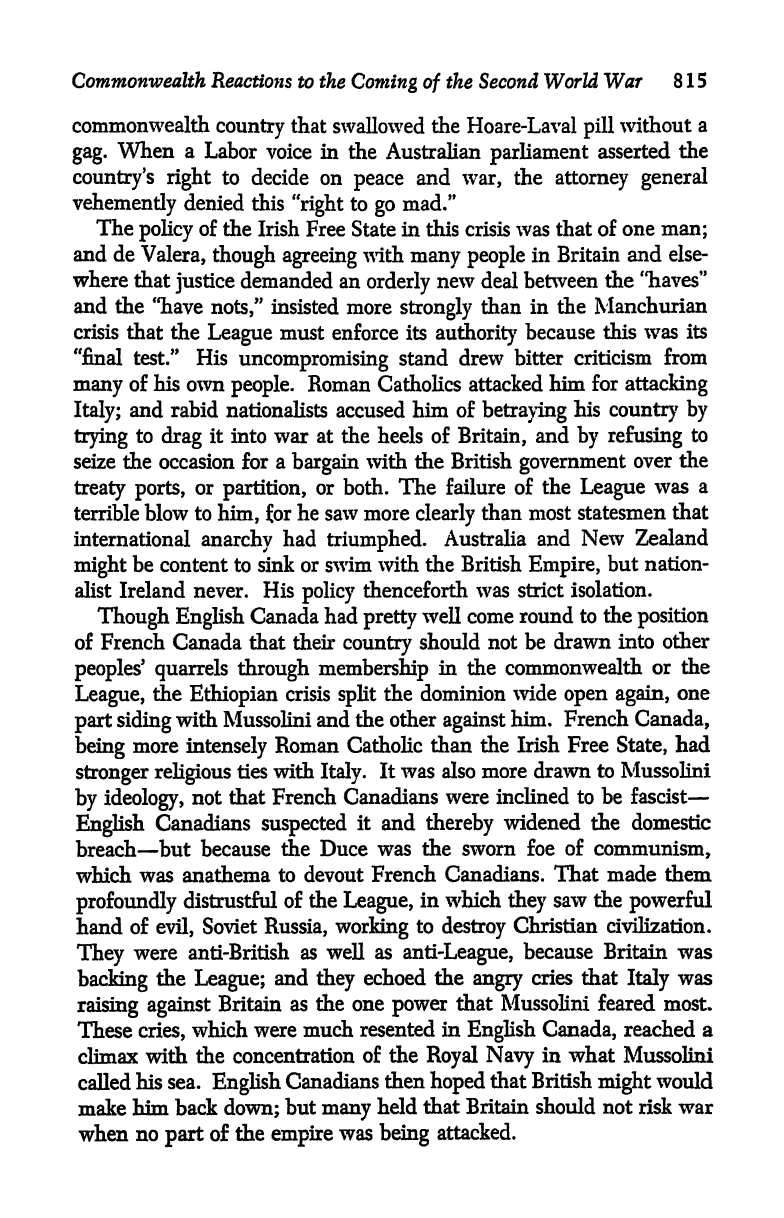
Commonwealth Reactions
to
the
Coming
of
the
Second
World
War
815
commonwealth
country
that
swallowed
the
Hoare-Laval
pill
without
a
gag.
When a
Labor
voice
in the
Australian
parliament
asserted
the
country's
right
to
decide on
peace
and
war,
the
attorney
general
vehemently
denied
this
"right
to
go
mad."
The
policy
of the
Irish Free State in
this
crisis
was
that
of
one
man;
and
de
Valera,
though
agreeing
with
many people
in
Britain
and else-
where
that
justice
demanded an
orderly
new
deal
between
the
"haves"
and the
"have
nots,"
insisted more
strongly
than
in the
Manchurian
crisis
that
the
League
must
enforce
its
authority
because
this was
its
"final
test."
His
uncompromising
stand
drew
bitter
criticism
from
many
of his own
people.
Roman Catholics
attacked
him
for
attacking
Italy;
and rabid nationalists
accused
him
of
betraying
his
country
by
trying
to
drag
it
into
war at
the heels of
Britain,
and
by refusing
to
seize the
occasion
for
a
bargain
with
the British
government
over
the
treaty ports,
or
partition,
or both.
The failure of
the
League
was
a
terrible blow
to
him,
for
he
saw more
clearly
than most
statesmen
that
international
anarchy
had
triumphed.
Australia
and
New Zealand
might
be content
to
sink or
swim
with the
British
Empire,
but
nation-
alist Ireland never.
His
policy
thenceforth
was strict isolation.
Though
English
Canada
had
pretty
well come
round
to
the
position
of French
Canada
that
their
country
should
not be
drawn
into
other
peoples' quarrels through
membership
in
the commonwealth
or
the
League,
the
Ethiopian
crisis
split
the dominion
wide
open again,
one
part
siding
with
Mussolini
and the
other
against
him. French
Canada,
being
more
intensely
Roman
Catholic
than
the Irish Free
State,
had
stronger
religious
ties with
Italy.
It was also
more drawn
to Mussolini
by
ideology,
not
that French Canadians
were inclined
to
be
fascist
English
Canadians
suspected
it and
thereby
widened
the
domestic
breach but
because
the Duce
was the sworn
foe
of
communism,
which
was
anathema
to devout French Canadians.
That made them
profoundly
distrustful
of
the
League,
in
which
they
saw
the
powerful
hand
of
evil,
Soviet
Russia,
working
to
destroy
Christian civilization.
They
were
anti-British
as
well
as
anti-League,
because Britain was
backing
the
League;
and
they
echoed
the
angry
cries that
Italy
was
raising
against
Britain as
the
one
power
that
Mussolini
feared
most.
These
cries,
which
were
much resented
in
English
Canada,
reached
a
climax
with
the
concentration
of the
Royal
Navy
in what
Mussolini
called
his
sea.
English
Canadians
then
hoped
that
British
might
would
make
him back
down;
but
many
held
that Britain
should not risk war
when
no
part
of
the
empire
was
being
attacked.
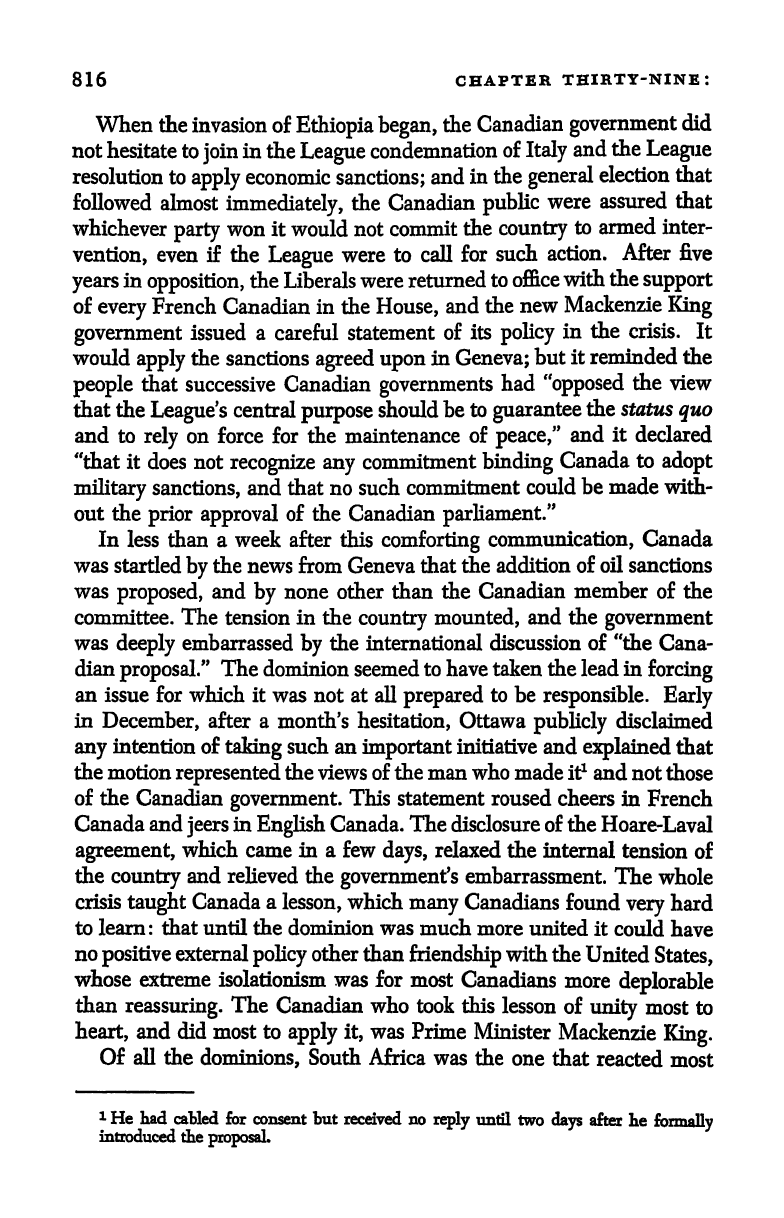
816
CHAPTER
THIRTY-NINE:
When the
invasion
of
Ethiopia began,
the Canadian
government
did
not
hesitate
to
join
in
the
League
condemnation
of
Italy
and
the
League
resolution to
apply
economic
sanctions;
and
in
the
general
election that
followed
almost
immediately,
the
Canadian
public
were
assured
that
whichever
party
won it
would
not commit
the
country
to
armed inter-
vention,
even
if
the
League
were to
call
for
such
action.
After
five
years
in
opposition,
the
Liberals
were
returned
to
office
with
the
support
of
every
French Canadian
in
the
House,
and
the
new
Mackenzie
King
government
issued
a
careful statement
of
its
policy
in
the crisis.
It
would
apply
the
sanctions
agreed upon
in
Geneva;
but
it reminded the
people
that
successive Canadian
governments
had
"opposed
the view
that the
League's
central
purpose
should
be
to
guarantee
the status
quo
and
to
rely
on force for
the maintenance
of
peace,"
and
it
declared
"that it
does
not
recognize any
commitment
binding
Canada
to
adopt
military
sanctions,
and that no such
commitment
could
be
made with-
out
the
prior
approval
of
the
Canadian
parliament."
In
less than a week after
this
comforting
communication,
Canada
was
startled
by
the
news
from
Geneva
that
the
addition
of
oil
sanctions
was
proposed,
and
by
none other than the
Canadian
member
of the
committee.
The
tension
in
the
country
mounted,
and
the
government
was
deeply
embarrassed
by
the
international
discussion of "the
Cana-
dian
proposal."
The dominion seemed
to
have
taken the lead
in
forcing
an issue
for which
it
was
not
at
all
prepared
to
be
responsible.
Early
in
December,
after a
month's
hesitation,
Ottawa
publicly
disclaimed
any
intention of
taking
such
an
important
initiative
and
explained
that
the
motion
represented
the
views
of the man who made it
1
and
not those
of the
Canadian
government.
This
statement roused
cheers
in
French
Canada
and
jeers
in
English
Canada.
The
disclosure
of
the
Hoare-Laval
agreement,
which came
in
a few
days,
relaxed
the
internal
tension
of
the
country
and
relieved
the
government's
embarrassment.
The
whole
crisis
taught
Canada
a
lesson,
which
many
Canadians
found
very
hard
to
learn:
that until the
dominion
was
much
more
united it
could
have
no
positive
external
policy
other than
friendship
with
the
United
States,
whose extreme
isolationism was
for
most
Canadians
more
deplorable
than
reassuring.
The
Canadian
who took this
lesson
of
unity
most to
heart,
and did most
to
apply
it,
was
Prime Minister
Mackenzie
King.
Of
all the
dominions,
South Africa
was the
one
that
reacted
most
1
He
had cabled
for
consent
but
received
no
reply
until
two
days
after
he
formally
introduced
the
proposal.
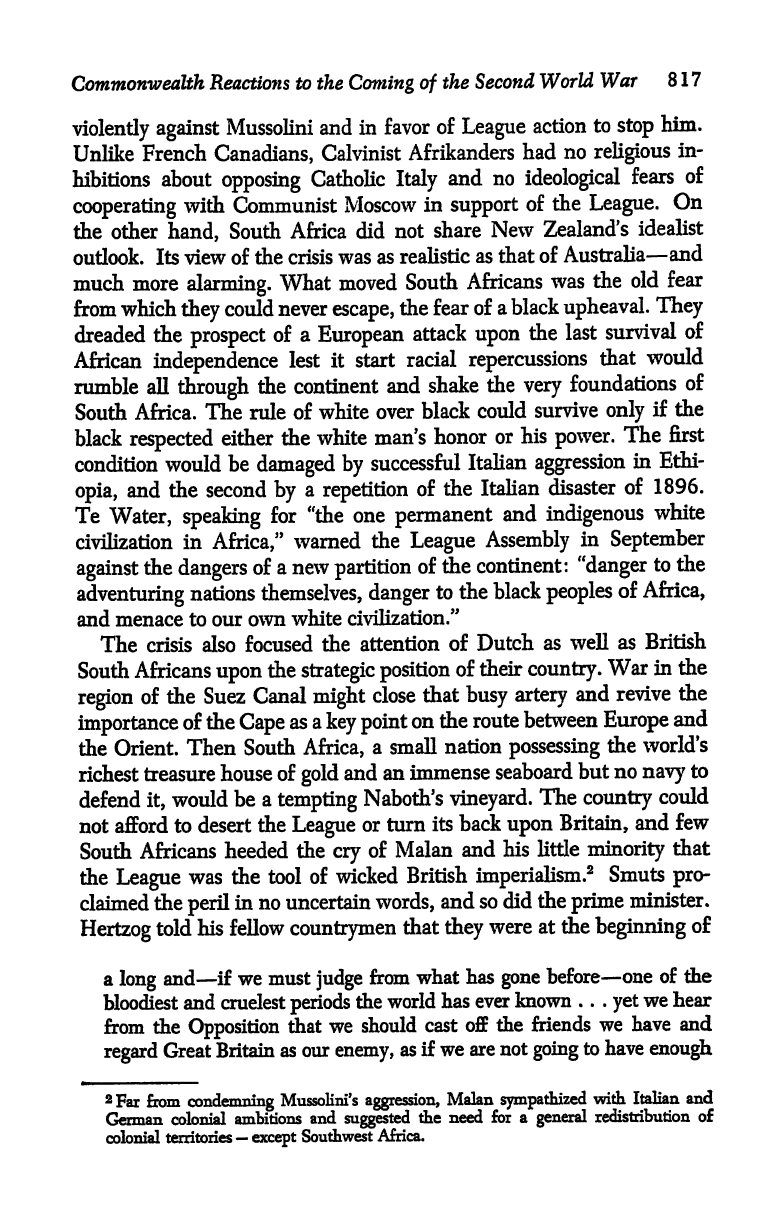
Commonwealth
Reactions
to
the
Coming
of
the Second
World
War
817
violently against
Mussolini
and in
favor
of
League
action
to
stop
him.
Unlike
French
Canadians,
Calvinist
Afrikanders
had
no
religious
in-
hibitions
about
opposing
Catholic
Italy
and
no
ideological
fears
of
cooperating
with
Communist
Moscow
in
support
of
the
League.
On
the other
hand,
South
Africa did
not
share
New
Zealand's
idealist
outlook.
Its
view of
the crisis
was as
realistic
as
that
of
Australia
and
much more
alarming.
What
moved
South
Africans
was
the
old
fear
from
which
they
could
never
escape,
the fear
of
a
black
upheaval.
They
dreaded
the
prospect
of
a
European
attack
upon
the
last
survival
of
African
independence
lest
it
start
racial
repercussions
that
would
rumble all
through
the continent
and
shake
the
very
foundations
of
South Africa.
The rule
of
white over
black
could
survive
only
if
the
black
respected
either
the
white
man's
honor or
his
power.
The
first
condition would
be
damaged
by
successful
Italian
aggression
in
Ethi-
opia,
and
the second
by
a
repetition
of
the
Italian
disaster
of
1896.
Te
Water,
speaking
for
"the
one
permanent
and
indigenous
white
civilization
in
Africa,"
warned
the
League
Assembly
in
September
against
the
dangers
of a
new
partition
of
the continent:
"danger
to
the
adventuring
nations
themselves,
danger
to
the black
peoples
of
Africa,
and
menace to our own
white
civilization."
The crisis
also focused
the
attention
of Dutch
as
well
as
British
South
Africans
upon
the
strategic
position
of
their
country.
War
in
the
region
of
the
Suez Canal
might
close
that
busy
artery
and revive
the
importance
of
the
Cape
as
a
key point
on
the route
between
Europe
and
the Orient.
Then South
Africa,
a
small
nation
possessing
the
world's
richest
treasure
house of
gold
and an
immense
seaboard
but
no
navy
to
defend
it,
would
be
a
tempting
Naboth's
vineyard.
The
country
could
not
afford to desert
the
League
or turn
its back
upon
Britain,
and
few
South
Africans
heeded
the
cry
of
Malan
and
his little
minority
that
the
League
was the
tool
of
wicked
British
imperialism.
2
Smuts
pro-
claimed
the
peril
in no
uncertain
words,
and
so did
the
prime
minister.
Hertzog
told
his fellow
countrymen
that
they
were
at
the
beginning
of
a
long
and
if we
must
judge
from
what has
gone
before
one of the
bloodiest
and
crudest
periods
the
world
has ever
known
...
yet
we hear
from the
Opposition
that
we
should
cast
off
the
friends
we
have and
regard
Great
Britain
as our
enemy,
as if we
are
not
going
to
have
enough
2
Far from
condemning
Mussolini's
aggression,
Malan
sympathized
with
Italian
and
German
colonial
ambitions
and
suggested
the
need for
a
general
redistribution
of
colonial
territories
except
Southwest
Africa.
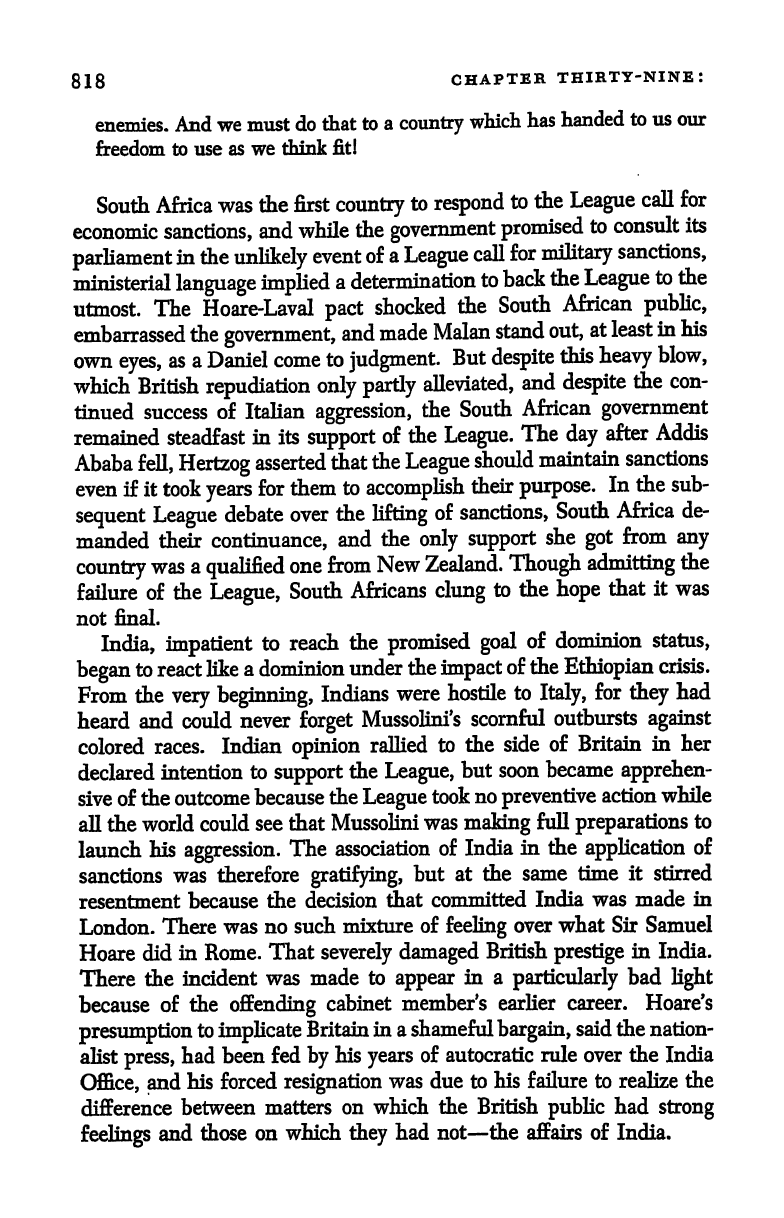
818
CHAPTER
THIRTY-NINE:
enemies.
And
we
must
do
that
to
a
country
which
has
handed
to us our
freedom
to
use
as we
think
fit!
South
Africa
was the
first
country
to
respond
to
the
League
call for
economic
sanctions,
and
while
the
government
promised
to
consult its
parliament
in
the
unlikely
event
of
a
League
call
for
military
sanctions,
ministerial
language
implied
a determination
to
back
the
League
to the
utmost.
The
Hoare-Laval
pact
shocked
the
South
African
public,
embarrassed
the
government,
and
made
Malan
stand
out,
at least
in
his
own
eyes,
as a Daniel
come
to
judgment.
But
despite
this
heavy
blow,
which
British
repudiation
only
partly
alleviated,
and
despite
the con-
tinued
success of
Italian
aggression,
the South
African
government
remained steadfast
in its
support
of
the
League.
The
day
after
Addis
Ababa
fell,
Hertzog
asserted
that
the
League
should
maintain
sanctions
even if
it took
years
for
them
to
accomplish
their
purpose.
In
the sub-
sequent
League
debate
over
the
lifting
of
sanctions,
South
Africa
de-
manded
their
continuance,
and
the
only
support
she
got
from
any
country
was
a
qualified
one
from
New
Zealand.
Though
admitting
the
failure
of
the
League,
South
Africans
clung
to
the
hope
that
it was
not
final.
India,
impatient
to
reach
the
promised
goal
of
dominion
status,
began
to
react like
a
dominion
under the
impact
of the
Ethiopian
crisis.
From the
very beginning,
Indians
were
hostile
to
Italy,
for
they
had
heard
and
could
never
forget
Mussolini's
scornful
outbursts
against
colored
races.
Indian
opinion
rallied
to
the side
of
Britain
in
her
declared
intention
to
support
the
League,
but
soon became
apprehen-
sive of
the
outcome
because
the
League
took
no
preventive
action
while
all the
world could
see that
Mussolini
was
making
full
preparations
to
launch
his
aggression.
The
association
of India
in the
application
of
sanctions
was
therefore
gratifying,
but
at the
same time
it
stirred
resentment
because
the decision
that
committed
India
was
made
in
London.
There
was no
such
mixture
of
feeling
over
what Sir
Samuel
Hoare
did
in Rome.
That
severely damaged
British
prestige
in India.
There
the incident
was
made to
appear
in a
particularly
bad
light
because
of
the
offending
cabinet
member's
earlier
career. Hoare's
presumption
to
implicate
Britain
in a shameful
bargain,
said
the nation-
alist
press,
had
been
fed
by
his
years
of autocratic
rule over
the
India
Office,
and
his forced
resignation
was due
to
his failure to realize
the
difference
between
matters
on which
the
British
public
had
strong
feelings
and
those
on
which
they
had
not the
affairs of India.
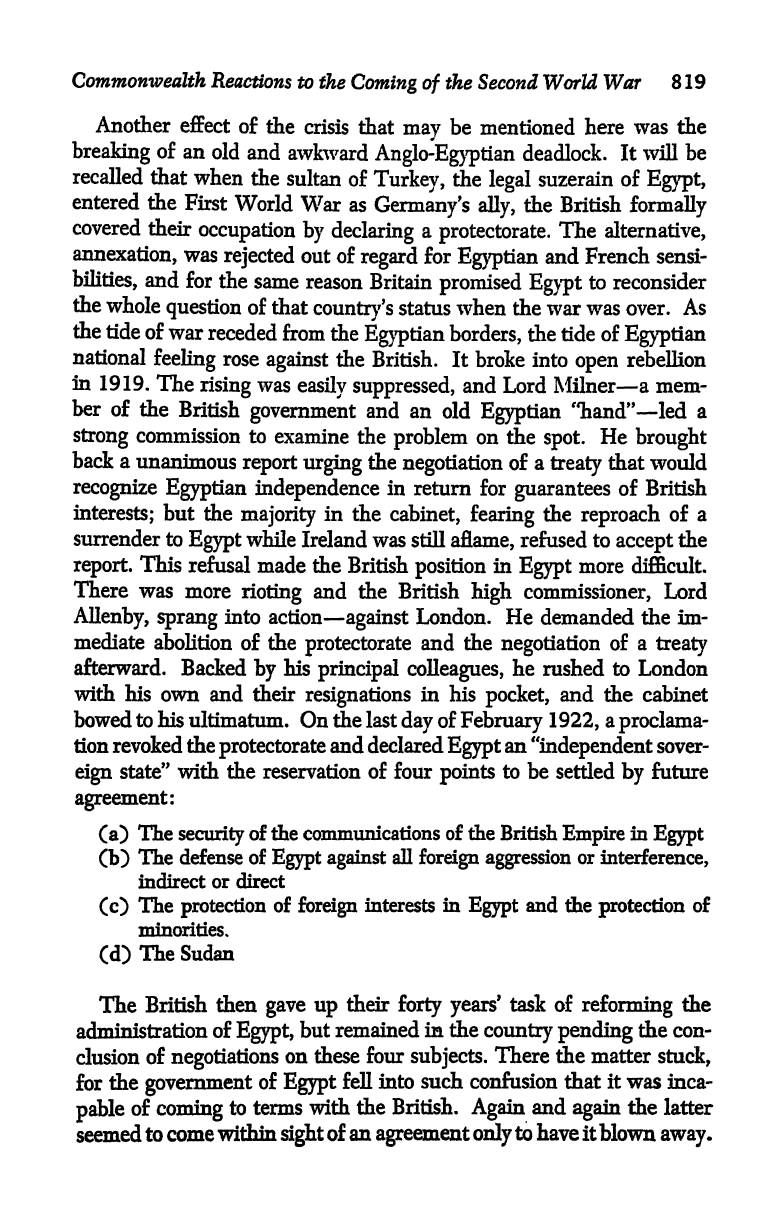
Commonwealth
Reactions
to
the
Coming
of
the Second
World
War
819
Another
effect
of the
crisis that
may
be mentioned
here
was the
breaking
of
an
old
and
awkward
Anglo-Egyptian
deadlock.
It will
be
recalled
that
when
the
sultan
of
Turkey,
the
legal
suzerain
of
Egypt,
entered
the
First
World War
as
Germany's
ally,
the
British
formally
covered
their
occupation
by
declaring
a
protectorate.
The
alternative,
annexation,
was
rejected
out
of
regard
for
Egyptian
and French
sensi-
bilities,
and
for
the
same
reason
Britain
promised
Egypt
to
reconsider
the
whole
question
of that
country's
status when the war was over.
As
the
tide
of
war
receded
from
the
Egyptian
borders,
the
tide
of
Egyptian
national
feeling
rose
against
the
British. It broke into
open
rebellion
in
1919.
The
rising
was
easily suppressed,
and Lord Milner
a mem-
ber
of
the
British
government
and an
old
Egyptian
"hand" led a
strong
commission
to
examine
the
problem
on the
spot.
He
brought
back
a
unanimous
report
urging
the
negotiation
of
a
treaty
that
would
recognize
Egyptian
independence
in return
for
guarantees
of British
interests;
but the
majority
in
the
cabinet,
fearing
the
reproach
of a
surrender
to
Egypt
while
Ireland
was
still
aflame,
refused
to
accept
the
report.
This
refusal
made the British
position
in
Egypt
more difficult.
There
was
more
rioting
and the British
high
commissioner,
Lord
AUenby,
sprang
into action
against
London. He
demanded
the im-
mediate
abolition of the
protectorate
and
the
negotiation
of
a
treaty
afterward.
Backed
by
his
principal
colleagues,
he
rushed
to London
with
his
own and
their
resignations
in his
pocket,
and the cabinet
bowed to
his ultimatum.
On
die last
day
of
February
1922,
a
proclama-
tion revoked the
protectorate
and
declared
Egypt
an
"independent
sover-
eign
state" with the reservation of four
points
to be
settled
by
future
agreement:
(a)
The
security
of the communications
of the
British
Empire
in
Egypt
00
The
defense
of
Egypt
against
all
foreign aggression
or
interference,
indirect
or direct
(c)
The
protection
of
foreign
interests
in
Egypt
and the
protection
of
minorities.
(d)
The
Sudan
The
British
then
gave
up
their
forty years'
task
of
reforming
the
administration
of
Egypt,
but
remained
in the
country
pending
the con-
clusion
of
negotiations
on these
four
subjects.
There
the matter
stuck,
for
the
government
of
Egypt
fell into
such
confusion that
it
was inca-
pable
of
coining
to terms
with
the
British.
Again
and
again
the latter
seemed
to come
within
sight
of
an
agreement
only
to have
it
blown
away*
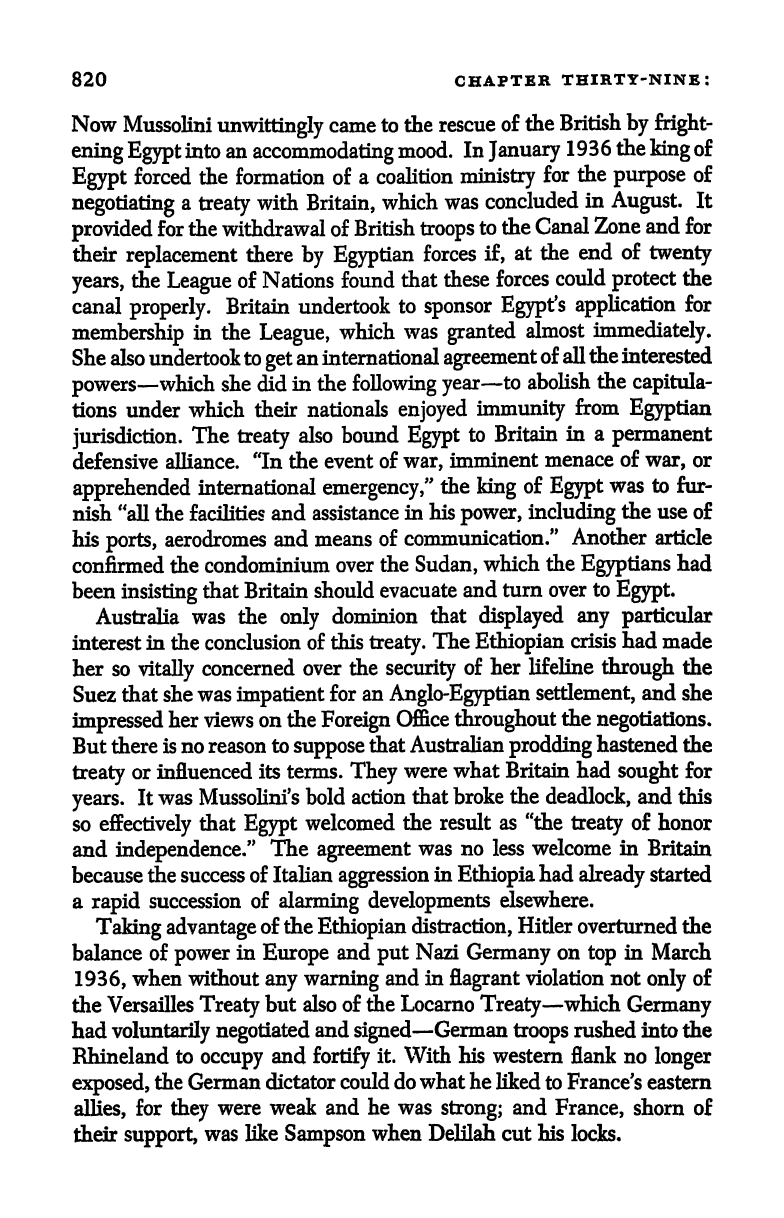
820
CHAPTER
THIRTY-NINE:
Now
Mussolini
unwittingly
came to
the rescue
of
the
British
by fright-
ening
Egypt
into
an
accommodating
mood.
In
January
1936
the
king
of
Egypt
forced the formation
of
a
coalition
ministry
for
the
purpose
of
negotiating
a
treaty
with
Britain,
which
was
concluded
in
August.
It
provided
for the
withdrawal of
British
troops
to
the
Canal
Zone
and
for
their
replacement
there
by Egyptian
forces
if,
at
the
end
of
twenty
years,
the
League
of Nations
found
that
these
forces
could
protect
the
canal
properly.
Britain
undertook
to
sponsor
Egypt's
application
for
membership
in the
League,
which
was
granted
almost
immediately.
She
also undertook
to
get
an
international
agreement
of
all
the
interested
powers
which
she
did
in the
following year
to
abolish
the
capitula-
tions under which
their
nationals
enjoyed
immunity
from
Egyptian
jurisdiction.
The
treaty
also bound
Egypt
to Britain
in
a
permanent
defensive
alliance.
"In
the
event of
war,
imminent
menace of
war,
or
apprehended
international
emergency,"
the
king
of
Egypt
was
to
fur-
nish "all
the facilities
and assistance
in
his
power,
including
the use
of
his
ports,
aerodromes
and
means
of
communication."
Another article
confirmed
the
condominium
over
the
Sudan,
which
the
Egyptians
had
been
insisting
that Britain
should
evacuate
and
turn
over to
Egypt.
Australia
was the
only
dominion
that
displayed
any particular
interest
in
the conclusion
of
this
treaty.
The
Ethiopian
crisis
had
made
her
so
vitally
concerned
over the
security
of
her lifeline
through
the
Suez
that she
was
impatient
for an
Anglo-Egyptian
settlement,
and she
impressed
her
views
on the
Foreign
Office
throughout
the
negotiations.
But there
is no
reason to
suppose
that Australian
prodding
hastened the
treaty
or
influenced
its
terms.
They
were what
Britain had
sought
for
years.
It
was
Mussolini's
bold
action
that broke
the
deadlock,
and
this
so
effectively
that
Egypt
welcomed
the result
as
"the
treaty
of
honor
and
independence."
The
agreement
was
no
less
welcome
in
Britain
because
the success
of Italian
aggression
in
Ethiopia
had
already
started
a
rapid
succession of
alarming
developments
elsewhere.
Taking
advantage
of the
Ethiopian
distraction,
Hitler
overturned the
balance
of
power
in
Europe
and
put
Nazi
Germany
on
top
in March
1936,
when
without
any warning
and
in
flagrant
violation
not
only
of
the Versailles
Treaty
but
also of
the
Locarno
Treaty
which
Germany
had
voluntarily
negotiated
and
signed
German
troops
rushed
into
the
Rhineland
to
occupy
and
fortify
it. With
his western
flank no
longer
exposed,
the
German
dictator
could do
what he
liked
to France's
eastern
allies,
for
they
were
weak and he
was
strong;
and
France,
shorn
of
their
support,
was like
Sampson
when
Delilah
cut
his
locks.
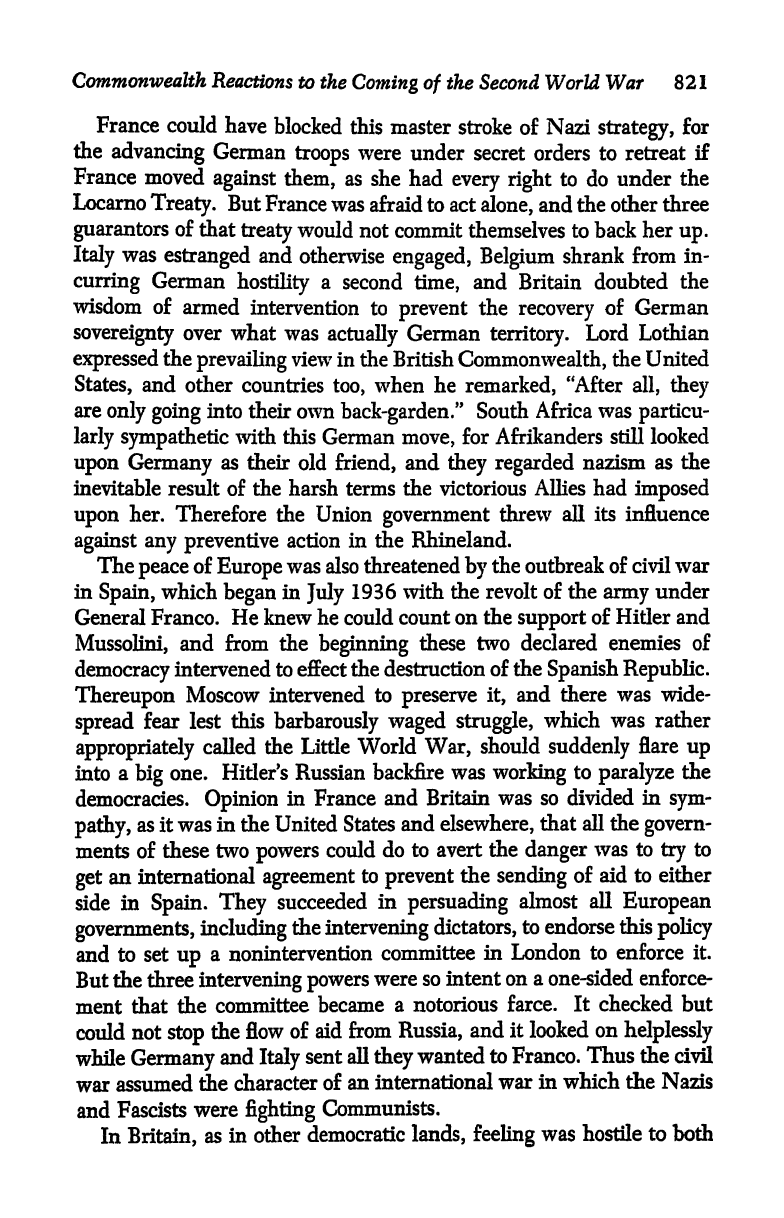
Commonwealth
Reactions
to
the
Coming of
the
Second World War
821
France could
have
blocked
this
master
stroke
of
Nazi
strategy,
for
the
advancing
German
troops
were
under secret
orders to
retreat
if
France
moved
against
them,
as
she had
every
right
to do
under
the
Locarno
Treaty.
But
France
was
afraid
to act
alone,
and
the other
three
guarantors
of
that
treaty
would not commit
themselves to
back
her
up.
Italy
was
estranged
and
otherwise
engaged, Belgium
shrank from
in-
curring
German
hostility
a
second
time,
and
Britain doubted
the
wisdom
of
armed
intervention to
prevent
the
recovery
of German
sovereignty
over
what
was
actually
German
territory.
Lord
Lothian
expressed
the
prevailing
view
in the
British
Commonwealth,
the
United
States,
and
other
countries
too,
when he
remarked,
"After
all,
they
are
only
going
into their
own
back-garden."
South
Africa
was
particu-
larly
sympathetic
with this
German
move,
for Afrikanders still
looked
upon
Germany
as
their
old
friend,
and
they
regarded
nazism as
the
inevitable result of
the
harsh
terms
the
victorious
Allies had
imposed
upon
her.
Therefore the Union
government
threw all
its influence
against
any preventive
action
in the Rhineland.
The
peace
of
Europe
was also
threatened
by
the
outbreak of
civil
war
in
Spain,
which
began
in
July
1936
with the revolt of the
army
under
General Franco. He knew he could
count on the
support
of Hitler and
Mussolini,
and
from
the
beginning
these
two
declared
enemies of
democracy
intervened
to
effect
the destruction
of the
Spanish
Republic.
Thereupon
Moscow
intervened to
preserve
it,
and
there
was
wide-
spread
fear lest
this
barbarously
waged
struggle,
which
was
rather
appropriately
called the Little
World
War,
should
suddenly
flare
up
into
a
big
one.
Hitler's
Russian backfire
was
working
to
paralyze
the
democracies.
Opinion
in France
and Britain
was so
divided
in
sym-
pathy,
as it
was
in the United States
and
elsewhere,
that all the
govern-
ments of
these two
powers
could
do to avert
the
danger
was to
try
to
get
an
international
agreement
to
prevent
the
sending
of
aid
to either
side
in
Spain.
They
succeeded
in
persuading
almost
all
European
governments,
including
the
intervening
dictators,
to endorse this
policy
and
to set
up
a
nonintervention
committee
in London to enforce
it.
But
the three
intervening powers
were so
intent on
a
one-sided enforce-
ment
that
the
committee
became
a
notorious
farce.
It
checked but
could
not
stop
the
flow
of aid
from
Russia,
and
it
looked
on
helplessly
while
Germany
and
Italy
sent all
they
wanted
to Franco.
Thus
the civil
war
assumed
tie character
of
an
international
war in which
the
Nazis
and
Fascists
were
fighting
Communists.
In
Britain,
as
in other
democratic
lands,
feeling
was
hostile to
both
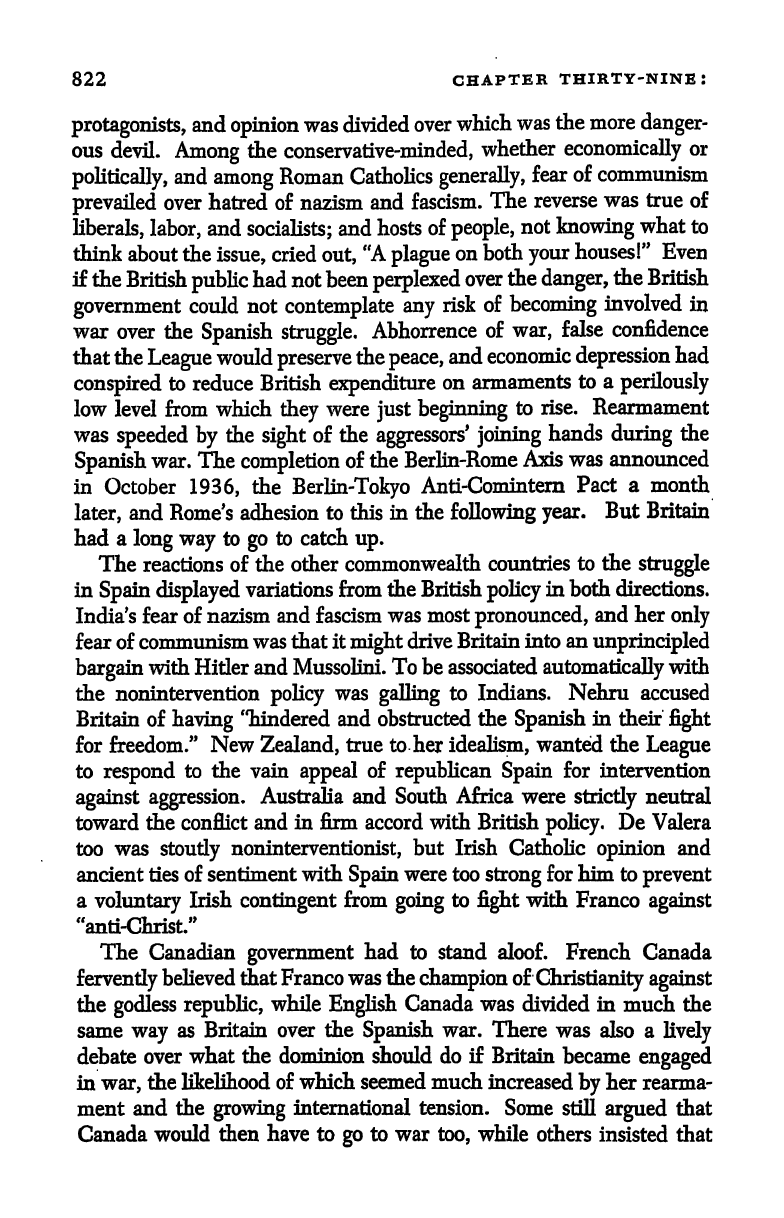
822 CHAPTER
THIRTY-NINE:
protagonists,
and
opinion
was
divided
over
which
was
the more
danger-
ous
devil.
Among
the
conservative-minded,
whether
economically
or
politically,
and
among
Roman Catholics
generally,
fear
of communism
prevailed
over hatred of nazism
and
fascism.
The
reverse
was
true
of
liberals,
labor,
and
socialists;
and
hosts
of
people,
not
knowing
what
to
think
about the
issue,
cried
out,
"A
plague
on
both
your
houses!" Even
if
the
British
public
had
not been
perplexed
over
the
danger,
the British
government
could not
contemplate
any
risk of
becoming
involved
in
war
over the
Spanish struggle.
Abhorrence
of
war,
false confidence
that the
League
would
preserve
the
peace,
and
economic
depression
had
conspired
to
reduce
British
expenditure
on armaments
to a
perilously
low level from which
they
were
just
beginning
to
rise.
Rearmament
was
speeded by
the
sight
of
the
aggressors'
joining
hands
during
the
Spanish
war.
The
completion
of
the Berlin-Rome
Axis
was
announced
in
October
1936,
the
Berlin-Tokyo
Anti-Comintern
Pact
a
month
later,
and
Rome's
adhesion to this
in
the
following year.
But
Britain
had
a
long
way
to
go
to
catch
up.
The
reactions
of
the
other commonwealth
countries
to the
struggle
in
Spain
displayed
variations from
the British
policy
in both
directions.
India's fear
of nazism
and
fascism
was most
pronounced,
and her
only
fear of
communism
was that it
might
drive
Britain into
an
unprincipled
bargain
with Hitler and Mussolini.
To be associated
automatically
with
the
nonintervention
policy
was
galling
to Indians.
Nehru accused
Britain of
having
"hindered and
obstructed the
Spanish
in
their
fight
for freedom."
New
Zealand,
true
to
her
idealism,
wanted
the
League
to
respond
to the
vain
appeal
of
republican Spain
for intervention
against
aggression.
Australia and
South Africa were
strictly
neutral
toward
the conflict
and
in firm accord
with
British
policy.
De
Valera
too was
stoutly
noninterventionist,
but
Irish
Catholic
opinion
and
ancient ties
of sentiment
with
Spain
were too
strong
for him to
prevent
a
voluntary
Irish
contingent
from
going
to
fight
with
Franco
against
"anti-Christ."
The Canadian
government
had
to stand aloof.
French Canada
fervently
believed
that Franco was the
champion
of
Christianity
against
the
godless
republic,
while
English
Canada was
divided in
much
the
same
way
as
Britain
over the
Spanish
war.
There
was also a
lively
debate
over what
the dominion should
do
if
Britain
became
engaged
in
war,
the
likelihood
of
which seemed much
increased
by
her rearma-
ment
and
the
growing
international tension. Some
still
argued
that
Canada
would
then have to
go
to war
too,
while
others
insisted
that
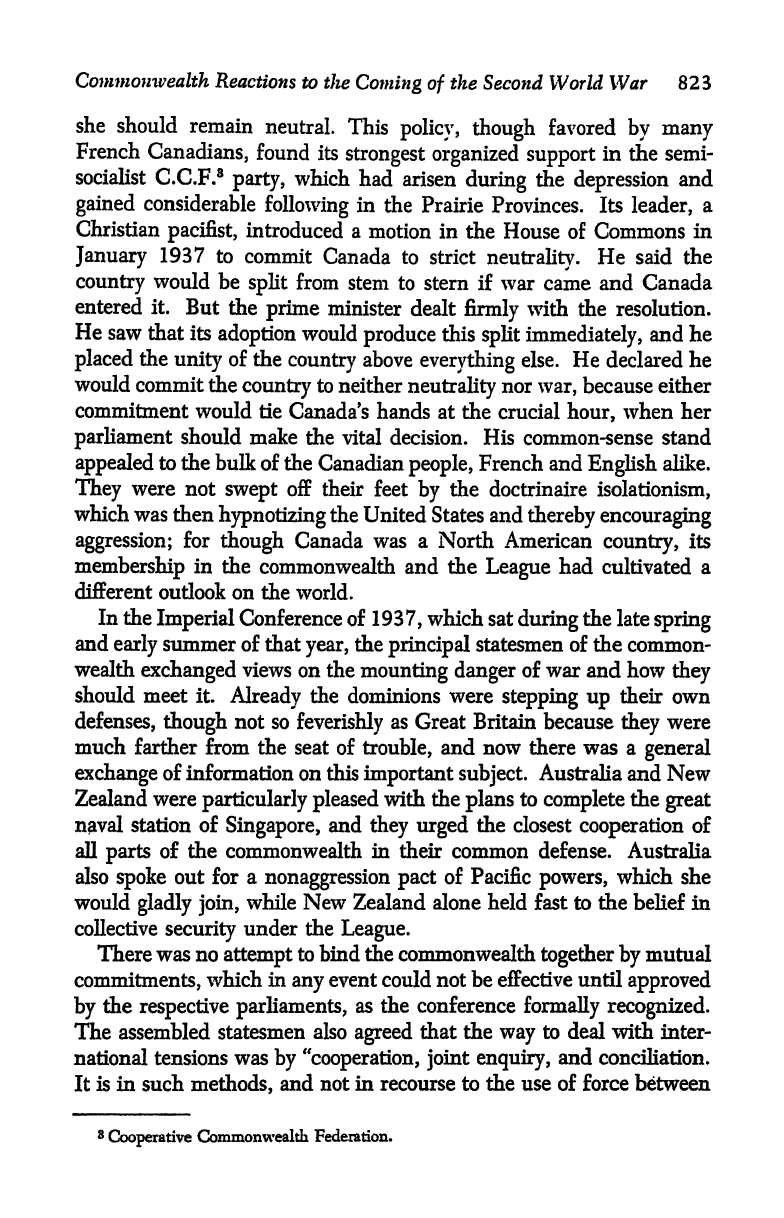
Commonwealth
Reactions
to
tJie
Coming
of
the Second World War 823
she should
remain
neutral.
This
policy,
though
favored
by many
French
Canadians,
found
its
strongest
organized support
in the
semi-
socialist
C.C.F.
8
party,
which
had arisen
during
the
depression
and
gained
considerable
following
in
the Prairie
Provinces.
Its
leader,
a
Christian
pacifist,
introduced
a
motion
in the
House of Commons
in
January
1937
to
commit
Canada to strict
neutrality.
He said the
country
would be
split
from stem
to
stern
if war came and Canada
entered
it.
But
the
prime
minister
dealt
firmly
with the resolution.
He
saw
that
its
adoption
would
produce
this
split immediately,
and he
placed
the
unity
of the
country
above
everything
else. He
declared
he
would
commit
die
country
to neither
neutrality
nor
war,
because
either
commitment
would
tie
Canada's
hands
at
the crucial
hour,
when her
parliament
should make
the vital decision. His
common-sense
stand
appealed
to the bulk
of the Canadian
people,
French and
English
alike.
They
were
not
swept
off their
feet
by
the doctrinaire
isolationism,
which was
then
hypnotizing
the
United States and
thereby
encouraging
aggression;
for
though
Canada
was a North American
country,
its
membership
in the
commonwealth
and
the
League
had
cultivated
a
different
outlook on
the world.
In
the
Imperial
Conference of
1937,
which sat
during
the late
spring
and
early
summer
of that
year,
the
principal
statesmen
of the
common-
wealth
exchanged
views
on the
mounting
danger
of
war
and
how
they
should meet
it.
Already
the
dominions were
stepping up
their
own
defenses,
though
not so
feverishly
as
Great
Britain
because
they
were
much farther
from
the seat
of
trouble,
and now there was a
general
exchange
of information
on
this
important subject.
Australia
and
New
Zealand were
particularly
pleased
with
the
plans
to
complete
the
great
naval station of
Singapore,
and
they
urged
the
closest
cooperation
of
all
parts
of
the
commonwealth
in their
common defense.
Australia
also
spoke
out
for
a
nonaggression
pact
of Pacific
powers,
which
she
would
gladly join,
while
New
Zealand alone held fast to the belief in
collective
security
under the
League.
There
was
no
attempt
to bind the
commonwealth
together by
mutual
commitments,
which in
any
event could
not be effective
until
approved
by
the
respective parliaments,
as the conference
formally
recognized.
The
assembled
statesmen
also
agreed
that
the
way
to deal
with
inter-
national tensions
was
by "cooperation,
joint enquiry,
and conciliation.
It is
in
such
methods,
and
not in recourse to the use of force between
3
Cooperative
Commonwealth
Federation.
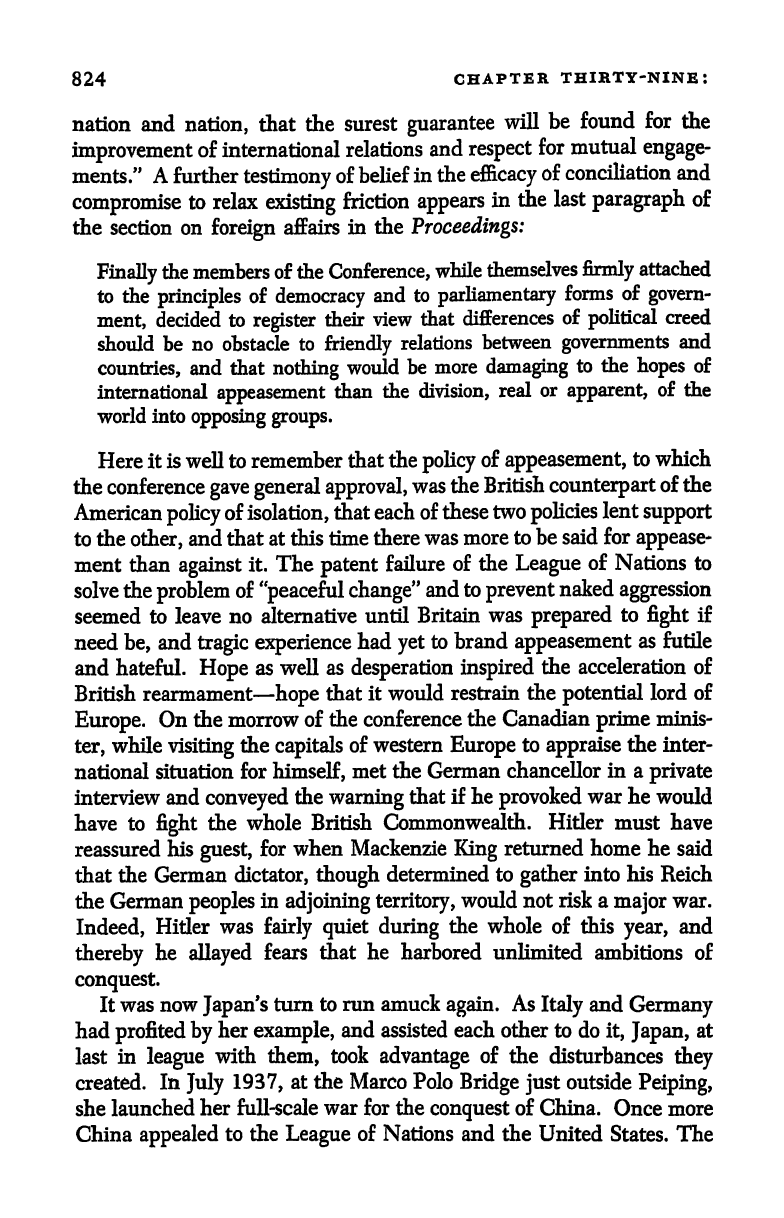
824
CHAPTER
THIRTY-NINE:
nation
and
nation,
that
the
surest
guarantee
will
be
found
for
the
improvement
of international
relations
and
respect
for mutual
engage-
ments."
A
further
testimony
of
belief
in
the
efficacy
of
conciliation
and
compromise
to
relax
existing
friction
appears
in
the last
paragraph
of
the
section
on
foreign
affairs
in
the
Proceedings:
Finally
the members
of the
Conference,
while
themselves
firmly
attached
to the
principles
of
democracy
and
to
parliamentary
forms
of
govern-
ment,
decided
to
register
their
view
that
differences
of
political
creed
should be
no
obstacle
to
friendly
relations
between
governments
and
countries,
and
that
nothing
would
be
more
damaging
to
the
hopes
of
international
appeasement
than
the
division,
real
or
apparent,
of
the
world
into
opposing
groups.
Here
it
is well to
remember that
the
policy
of
appeasement,
to which
the conference
gave
general
approval,
was the
British
counterpart
of the
American
policy
of
isolation,
that
each of
these
two
policies
lent
support
to
the
other,
and that
at this time
there
was
more to
be
said
for
appease-
ment than
against
it. The
patent
failure
of the
League
of Nations to
solve
the
problem
of
"peaceful
change"
and
to
prevent
naked
aggression
seemed
to leave no
alternative
until
Britain
was
prepared
to
fight
if
need
be,
and
tragic
experience
had
yet
to brand
appeasement
as futile
and hateful.
Hope
as well
as
desperation
inspired
the acceleration of
British
rearmament
hope
that
it would
restrain the
potential
lord
of
Europe.
On
the morrow
of the
conference
the Canadian
prime
minis-
ter,
while
visiting
the
capitals
of
western
Europe
to
appraise
the
inter-
national
situation
for
himself,
met the German
chancellor
in
a
private
interview
and
conveyed
the
warning
that
if he
provoked
war
he
would
have to
fight
the whole
British Commonwealth.
Hitler
must have
reassured
his
guest,
for
when Mackenzie
King
returned
home he said
that
the German
dictator,
though
determined to
gather
into
his Reich
the German
peoples
in
adjoining
territory,
would
not risk a
major
war.
Indeed,
Hitler
was
fairly
quiet during
the
whole of this
year,
and
thereby
he
allayed
fears
that he
harbored unlimited
ambitions
of
conquest.
It was now
Japan's
turn to
run amuck
again.
As
Italy
and
Germany
had
profited
by
her
example,
and assisted each other
to do
it,
Japan,
at
last
in
league
with
them,
took
advantage
of the
disturbances
they
created.
In
July
1937,
at the Marco
Polo
Bridge
just
outside
Peiping,
she launched
her full-scale
war
for
the
conquest
of
China.
Once
more
China
appealed
to the
League
of Nations
and
the
United
States, The
